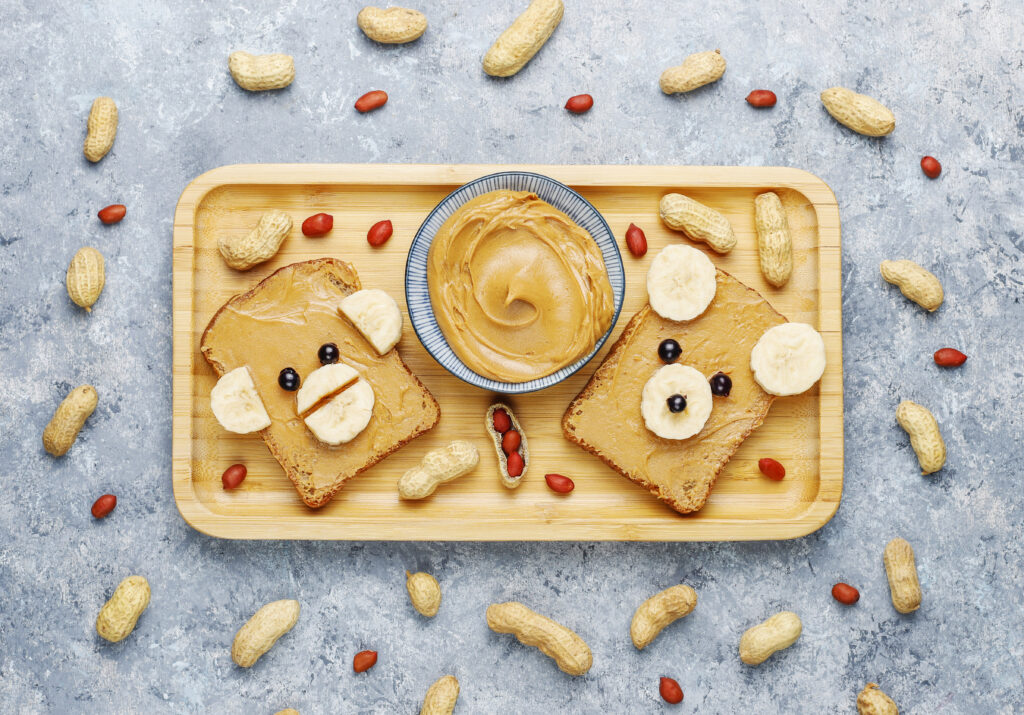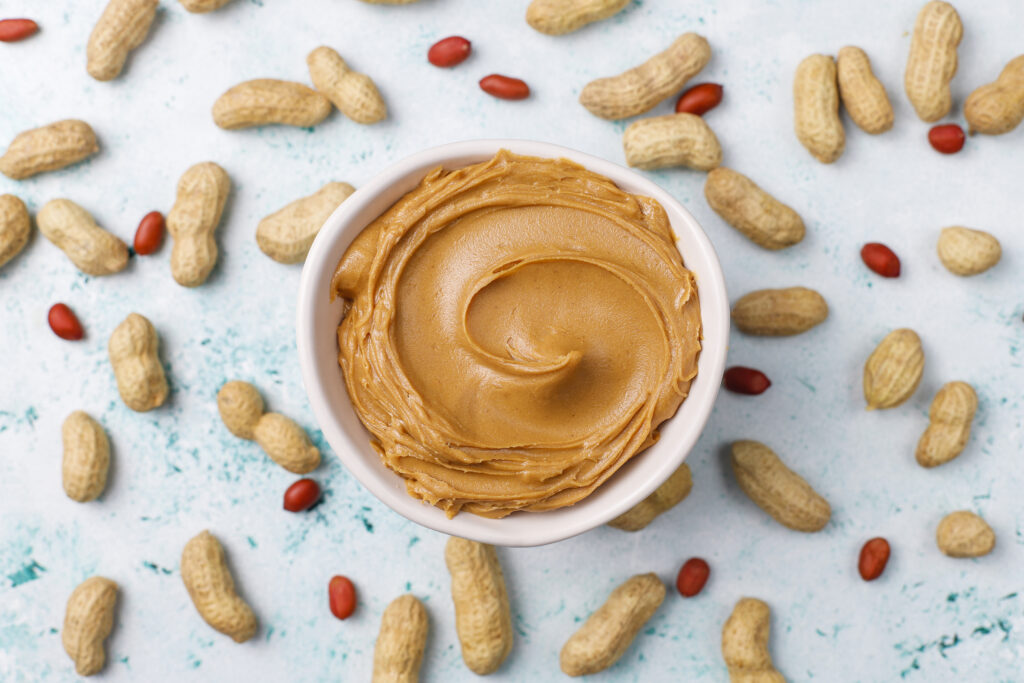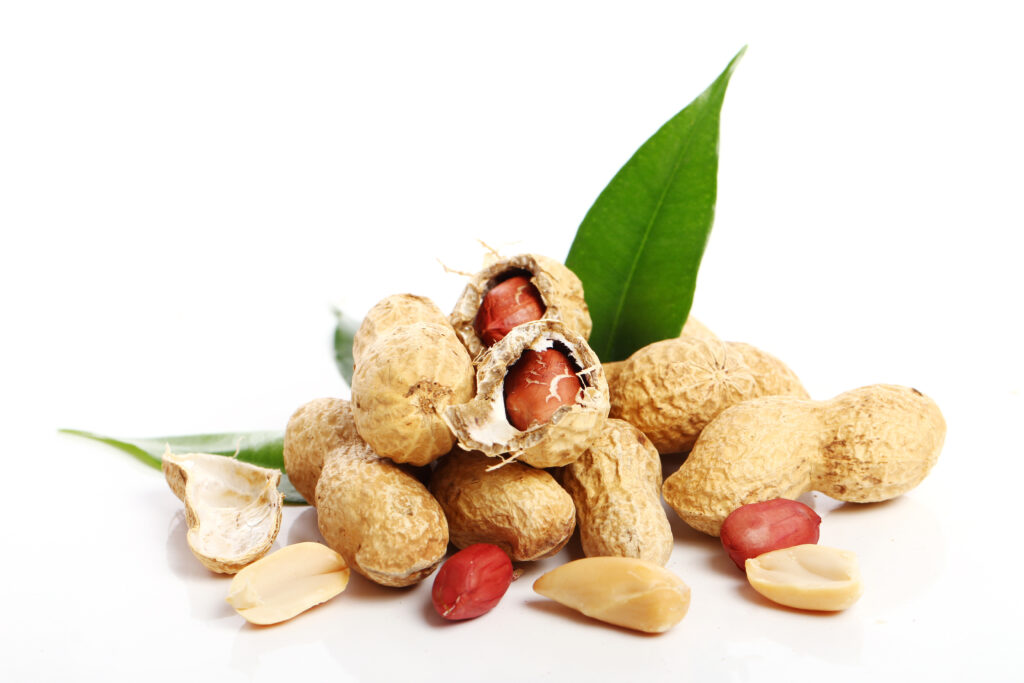In the last 4-5 years, peanut butter benefits have gained immense popularity and its craze has increased like wildfire. The global market for peanut butter benefits was valued at $2.1B in 2019. As for 2022, its market size has escalated to $5.10B. Further, it is expected to grow at an annual rate of 6.9% per year. The rising trend is due to health awareness and the increase in the demand for protein-rich diets, as well as knowledge of peanut butter benefits.
But have you ever wondered what’s the better option: peanut butter vs. peanuts? Peanut butter is made from peanuts, but why do people prefer peanut butter in the battle of peanut butter vs. peanuts? Some even believe that peanut butter is a lot healthier than peanuts. Is it true?
Suggested read – Peanut Butter vs. Peanuts- Which is better for you?
Let’s find out all about peanut butter benefits.
Peanut Butter vs. Peanuts—Nutrition Breakdown

Peanut butter benefits are plenty! 100-gram of Peanut butter supplies:
- Carbohydrates: 22 grams of carbs
- Protein: 22.5 grams of protein (However, specifically designed High Protein peanut butter can provide more!)
- Fat: 51 grams of fat
While 100 grams of Raw Peanuts provide (peanut butter vs. peanuts):
- Protein: 25.8 grams of high-quality plant-based protein (if boosted by pea protein isolate)
- Carbohydrates: 16.1 grams of carbs
- Fat: 49.2 grams of fats
Essential Vitamins and Minerals in Peanut Butter vs. Peanuts

Peanut butter is nutritious and loaded with essential vitamins and minerals. You may opt for OZiva Natural peanut butter crunchy as it is cholesterol free, has zero trans fat, improves your heart health, boosts energy, and meets your daily protein value,along with other peanut butter benefits. 100 grams of OZiva Peanut Butter can provide up to 60% vitamins of your daily requirements – that’s just one of the many peanut butter benefits.
- 100 gm of Peanut butter (PB) can fulfil 60% of the daily requirements of Vitamins E.
- 3.5 ounces of PB can fulfil 84% Vitamin B3 (niacin) of your daily value
- 100 gm PB bestows 29% Vitamin B6 of your daily vitamin requirements as part of peanut butter benefits.
- It renders 18% folate of your daily value.
- Peanut butter also provides 37% magnesium for your daily requirements
- It holds 56% copper of your daily value.
The peanut butter benefits are many! On the other hand, peanuts are also enriched in various vitamins and minerals.
- Peanuts are rich in Biotin, which helps maintain healthy skin, avoid ageing and also helps during pregnancy.
- Peanuts contain an excellent source of copper. Thus, they help maintain healthy bones, blood vessels, and immunity.
- It contains vitamin B3, which keeps your nervous system healthy and boosts brain functioning.
- Peanut contains Folate (vitamin B9 or folic acid) which helps maintain proper cell growth.
- They are rich in manganese, which improves heart health.
- Peanuts are an excellent source of Vitamin E, which is a powerful antioxidant.
Does it make you gain weight?

Scientifically speaking, yes, despite all the peanut butter benefits, it does make you gain weight. Peanut butter helps gain weight if you consume it in excess quantities. It contains all the nutritional values that may lead you to gain weight. If you’re looking for the best peanut butter with the most peanut butter benefits at an affordable price, you may try the OZiva all-natural crunchy peanut butter.
On the other hand, peanuts are associated with weight loss. It helps maintain a Lower Body Mass Index (BMI). As per recent reports, it has been observed that peanut eaters have low BMI. This is due to the amino acid content that improves weight regulating hormones.
The easiest way to gain weight is to eat balanced whole foods (unprocessed) – packed with carbs, proteins, and fat. You may add peanut butter to your diet to add up the required nutrients and get peanut butter benefits.
Is it better to consume peanut butter vs. peanuts?
Peanut butter is a paste form of dry-roasted peanuts. It contains additional ingredients to modify the taste and flavours. Let’s see which one is best for your consumption (peanut butter vs. peanuts):
When it comes to protein, both peanut and peanut butter belong to the protein-rich category. However, when it’s about calorie consumption, peanut butter is on the higher side. One serving of peanut butter contains 94 calories while peanuts contain about 80.5 calories per serving.
Peanut butter benefits when it comes to vitamins are many. It is rich in Copper, Vitamin B1, and omega-6. In addition, it is a natural source of arginine, an amino acid that may prevent heart and vascular disease by promoting good blood vessel function. Further, peanut butter benefits include managing blood sugar levels and cholesterol.
The total carbohydrate content of raw peanuts is lower than that of peanut butter. Consequently, peanut butter has a slight edge over raw peanuts when it comes to peanut butter benefits.
Hence, both (peanuts and peanut butter) come with their own benefits. They provide almost similar amounts of nutrition and cater to the daily body requirements. However, when it comes to choosing peanut butter vs. peanuts, peanut butter is a better choice for the delicious taste and additional peanut butter benefits.
To boost energy, improve heart health and get other peanut butter benefits, you may consider trying out the all-natural OZiva High Protein Peanut Butter. It is filled with 50% heart-healthy monounsaturated and polyunsaturated fats. These fats lower “bad” LDL cholesterol and triglyceride levels, while keeping “good” HDL cholesterol high as the primary peanut butter benefits.
The OZiva Natural peanut butter and the OZiva High Protein Peanut Butter Crunchy are made from completely natural ingredients with no artificial sweeteners, stabilisers, or preservatives. Besides, you get all the peanut butter benefits with zero added sugar and salt. Hence, it’s absolutely healthy and delicious!
Can you eat peanut butter regularly (Peanut butter vs. peanuts)?
Of course, you can eat peanut butter regularly to gain healthy weight and other peanut butter benefits. Nevertheless, keep in mind to consume it in moderation, or you might gain a lot more weight than you need.
Also, be mindful that some peanut butter brands add additional flavours, sugar, oils and fats, which may lead to some potential health threats. For the best result, search out for all-natural peanut butter without these additionally added components for peanut butter benefits.
If you are looking for peanut butter benefits with high protein, you may opt for the OZiva High Protein Peanut Butter Crunchy. It is nutrient-rich and delicious peanut butter – with 30% protein, 50% healthy fat, dietary fibre, and several vitamins & minerals. It helps improve heart health and boost energy. Furthermore, it’s free of cholesterol or trans fats. Take advantage of all peanut butter benefits.
Last modified: August 5, 2022

